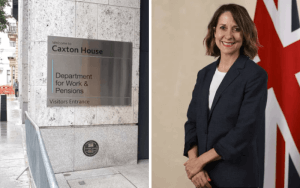The government has failed to set up a single committee involving experts from outside the two departments examining the future of working-age social care, nearly four months after the programme of work was announced.
On 16 November, Damian Green, at the time the work and pensions secretary, announced that the government would publish a new green paper on older people’s social care by the end of July.
He also announced a “parallel programme of work” on working-age adults with care needs, which would be aligned with the green paper and would be led by the Department for Health and Social Care (DHSC) and the Ministry of Housing, Communities and Local Government.
But nearly four months later, and less than five months before the deadline Green set for the parallel green paper to be published, DHSC has told Disability News Service (DNS) that it has yet to set up a single committee or working group involving stakeholders from outside the two departments.
The admission came in a response to a DNS freedom of information request, which asked for the names of people from outside the departments who had joined any committees or working groups set up as part of the work stream.
DHSC said in its response to the request: “DHSC does not hold the information you requested, as no such committees or working groups have yet been established to support the programme of work on working age adults with care needs.
“The government is currently developing plans for engaging with stakeholders and expects to engage widely.
“We will ensure that the views of a range of people who use social care services, including adults with disabilities, closely inform this work as it progresses.”
Tracey Lazard (pictured), chief executive of Inclusion London, said this failure “demonstrates the government’s lack of commitment to seriously taking anything forward in this area.
“The angle that has been consistently taken is to blame local authorities for all the problems in social care and this further confirms our suspicion that the government wants to avoid this question altogether.
“It shows a complete dismissal of the serious adverse impact that the crisis in social care is having on disabled people and a derogation of responsibility.
“The issue needs full and meaningful face to face engagement with disabled people and our organisations, and committed resources and time to look at how the current system is failing disabled people and how this can be urgently addressed.”
Only last week, DNS reported how disabled people’s organisations (DPOs) said they would write to care minister Caroline Dinenage to protest at her decision to organise a “roundtable” meeting – which also involved the Department for Work and Pensions – to discuss the future of working-age social care, but without inviting a single disabled people’s organisation (DPO).
The disabled crossbench peer Baroness [Jane] Campbell was eventually invited to the roundtable, but only after a minister mentioned in the House of Lords that it was taking place.
And Disability Rights UK (DR UK) said this week that it was also subsequently invited to the event, but with just 20 hours’ notice, following criticism of the failure to involve DPOs.
Baroness Campbell said the roundtable event had not left her “brimming with confidence about a future strategy”.
She said: “I felt that the three departments involved don’t even have a skeleton strategy of what they intend to do and hope to achieve at the end of this exercise.”
When asked “what the parallel process was going to be and what was the aim”, for example a green paper, or a new commission on working-age social care, she and others were told that the government “accept that we need to be clearer about this exercise”.
Baroness Campbell said: “I personally warned against another ‘listening, or consultation exercise’, as disabled people had had enough of this process, which has always ended in reports collecting dust on departmental shelves.”
She added: “So far the future is not looking bright.”
Sue Bott, DR UK’s deputy chief executive, said the DHSC freedom of information response was “extraordinary”.
She said that 51 per cent of spending on adult social care was now on people below retirement age.
She said: “Just being ‘in listening mode’ is very disappointing and not good enough.
“Over the years there have been countless consultations about social care.
“There comes a point where there are so many gaps that you have to conclude the whole system is failing. What is needed now is not listening mode but action mode.”
When asked why no progress appeared to have been made with the working-age parallel workstream, and particularly why no working groups or committees had been set up with members from outside the departments, nearly four months after Damian Green made the announcement to MPs, a DHSC spokeswoman refused to comment.

 Disabled peers plan to ‘amend, amend, amend, amend, amend’ after assisted dying bill reaches Lords
Disabled peers plan to ‘amend, amend, amend, amend, amend’ after assisted dying bill reaches Lords Ministers are secretly considering means-testing PIP, DWP admits, despite pledge in green paper
Ministers are secretly considering means-testing PIP, DWP admits, despite pledge in green paper ‘We will not give a single inch,’ disabled activists vow, as Kendall publishes disability cuts bill
‘We will not give a single inch,’ disabled activists vow, as Kendall publishes disability cuts bill